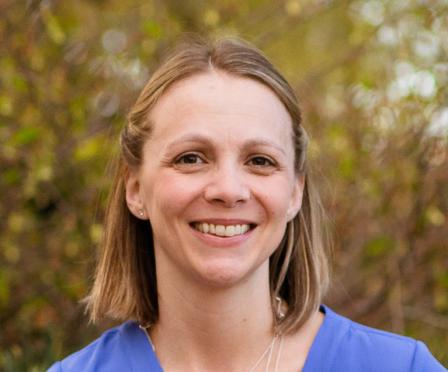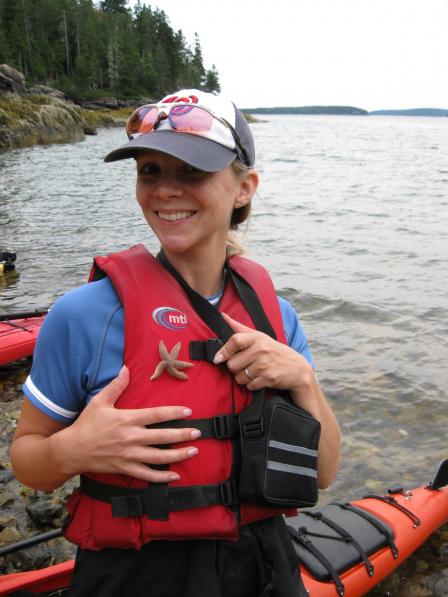Meet EPA Ecologist Caroline Ridley, Ph.D.
 EPA ecologist Caroline Ridley .
EPA ecologist Caroline Ridley .
EPA ecologist Caroline Ridley assesses the impact of human activities on the environment. Her recent work includes examining the impacts of mining on salmon in Alaska and the impacts of hydraulic fracturing for oil and gas on drinking water nationwide. Her favorite thing about her work is seeing how science can affect policy.
When did you first know you wanted to be a scientist?
Both my parents were scientists. We used to spend summers in Minnesota in the Boundary Waters, and everything about that was so interesting to me. We saw carnivorous plants in the wild. One year, we saw a meteor shower while we were on a canoe trip in the middle of nowhere. Those are some of the most memorable experiences for me growing up, just being outside, observing nature, and asking questions about nature.
Tell us about your scientific/educational background.
I got my BA in biology at Grinnell College in Grinnell, Iowa. After spending two years trying to figure out what I wanted to do in graduate school, I ended up at the University of California, Riverside for my Ph.D. work in the botany and plant sciences department.
I studied evolutionary ecology and genetics in school, which is different than most of my current work at EPA. It’s been an incredible experience to intellectually grow into my job.
 Ridley explores the ecology of Acadia National Park.How does your science matter? In other words, how does your science make a difference?
Ridley explores the ecology of Acadia National Park.How does your science matter? In other words, how does your science make a difference?
I work for EPA’s Center for Public Health and Environmental Assessment where my projects involve reading many hundreds of scientific articles and combining their individual findings to produce new insights into how humans are changing the environment. I also research the ways in which human activities could be carried out to minimize effects on the environment. All of my work directly supports our colleagues in state and federal policy-making offices who are trying to develop science-based guidelines and regulations that protect land, water, and the critters that live there.
What do you like most about your research?
I love that I’m so close to the decision-making process. I can really see how science can influence a decision. When I hear some announcement about how a state or federal policy is grounded in science and better protects the environment and human health, I’m really proud. I love having those moments.
If you could have dinner with any scientist, past or present, who would it be? What would you ask him or her?
That’s easy--I would sit down with Charles Darwin. I’m trained as an evolutionary biologist so Charles Darwin is the father of my discipline. I would love to ask him about his travels in South America and the Galapagos Islands. He spent years on a boat traveling to those places, observing nature, plants, and animals. It sounds like an amazing adventure.
If you could have one superpower, what would it be and why?
There have been times when I’ve walked into a room and thought it would be helpful be able to read minds and know exactly where people are coming from. Not all the time but in certain contexts, it would certainly be useful.
Any advice for students considering a career in science?
Some people feel that when you choose science, that’s it, you’re stuck in the lab. We need to broaden the idea of what a career in science means. People who have multiple career interests--say in art and science or politics and science--should think about how to combine those interests. If you love art and science, maybe you become an illustrator for science textbooks.
What do you think the coolest scientific discovery was and why?
I think the coolest discoveries are the ones where someone could not observe a phenomenon with the naked eye and had to rely on theory and equations. Everything that I’ve done with science is based off observations that I can make. Anything that’s on a tiny scale, you can’t see it, so you have to theorize and make predictions and then see if those predictions match up with other kinds of measurements. To me that requires a very specific kind of brain, and I have a lot of respect for those people.
Describe any steps you take in your daily life to protect the environment.
I use my water bottle and reusable coffee mugs every single day, so I’m not throwing away plastic water bottles and cups. My family and I ride our bikes down to the farmer’s market here on weekend, so we are getting a car off the road for a little bit. We buy local produce to reduce the amount of emissions it takes to move food long distances.
Editor's Note: The opinions expressed herein are those of the researcher alone. EPA does not endorse the opinions or positions expressed.
